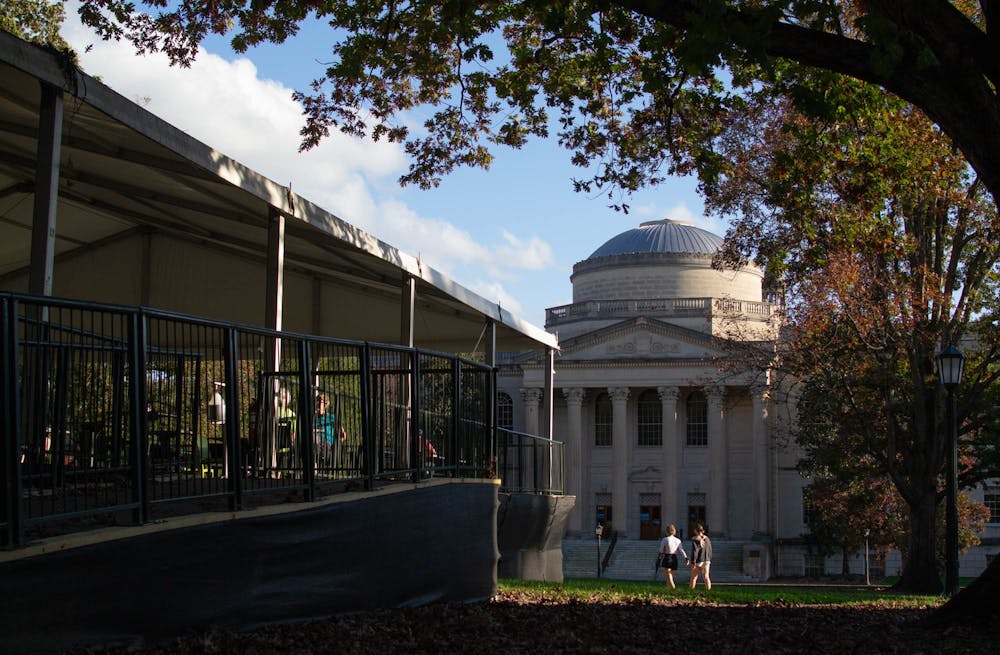“It's refreshing to know that the University has done 180 degrees from telling everybody that testing creates a false sense of security, to coming to this end where they are saying that we will do robust testing,” Aikat said. “I was very impressed that that happened, but truth be told, that should have happened in spring, but we kept explaining it away with a statement that was not proved true.”
Seeking community input
The Campus & Community Advisory Committee, created by the Chancellor and composed of students, faculty, staff and members of the surrounding community, began meeting in September to provide input on decisions related to spring reopening plans.
“One of the things I really applaud the Chancellor for doing, and that is listening particularly to the campus community — a campus community that sought greater input and information and knowledge on the front end of these decisions,” Blouin said.
Ryan Collins, president of the Graduate and Professional Student Federation and a committee member, said there has been a push for more constituencies to be involved in the decision-making process before decisions are finalized. The creation of the committee shows this shift, he said.
“One of the, I think most consistent criticisms, including by myself and others in our leadership team within GPSF, was a lack of getting feedback and input on decisions ahead of time," Collins said.
Lamar Richards, a member of the Campus & Community Advisory Committee and the chairperson of the Commission on Campus Equality and Student Equity, echoed this criticism of the fall.
“Now, the University is taking this extra step to say, ‘We want your input, by way of this committee, for spring planning, and we’re committed to working this committee to see what the best recommendations are,’” Richards said.
Changes for the spring
In a campuswide email on Oct. 23, the University announced changes to the spring semester, including:
- The implementation of regular COVID-19 evaluation testing and mandatory reentry testing
- Availability of single-occupancy rooms for those living on campus
- Five modes of instruction for courses, both in person and remote
“One thing that we did also learn from the limited experience that we had in the fall, as well as the experiences of other universities, is that, when you do the preparation, as we have done in the fall and will continue to do in the spring, the classroom setting is actually very, very safe,” Blouin said.
To get the day's news and headlines in your inbox each morning, sign up for our email newsletters.
Additionally, Blouin said the Campus & Community Advisory Committee indicated a need for improvement of quarantine and isolation dorms.
"They also indicated we needed to do better in regards to quarantine and isolation, not only in terms of the number of beds we would have for that, but also to improve the conditions in quarantine and isolation, because many students expressed concerns about life in isolation," Blouin said.
Enforcing community standards
In the most recent Campus & Community Advisory Committee meeting, the committee discussed the enforcement of community guidelines in the spring, focusing on how to make sure people abide by the standards.
"We are still very early in those discussions, so I don't know that I've seen enough from leadership yet as to know whether or not that's going to be an improvement," Collins said.
Richards instead highlighted the importance of engagement and empowerment over enforcement. He presented the 3 Es — engagement, empowerment and enforcement — as a recommendation to the committee.
Richards said his hope is that by engaging and empowering students, they will encourage their peers to adhere to community standards — making it rare that enforcement will be necessary.
“But see, what Carolina did in the fall is that all they had was enforcement,” Richards said. “Now, we’ve grown to learn that this virus has more repercussions than just the virus itself, so we must engage and we must empower.”
‘A Pollyanna perspective’
Aikat said that instead of trying to live with the uncertainty that exists, universities that were successful in the fall, in North Carolina and nationwide, are planning ahead.
“You know, this is bothering me now — I mean, we are heading for the same situation,” Aikat said. “... Spring, I heard that there will be testing, there will be contact tracing. Those are all things, right, I mean, there is nothing new and novel we have come up with. But, there is one thing that I have found — the universities that are successful, they are planning.”
Aikat said a foolproof plan includes two things: a way to combat the pandemic headlong, with a clear plan, and then an escape.
“I mean, as much as I believe in the power of prayer, this is not the time to hope and pray that, ‘Oh, everything will be fine.’ I think that's a Pollyanna perspective,” Aikat said. “When you have a Pollyanna perspective, things will go. And when things go wrong, you have not prepared for it.”
university@dailytarheel.com




